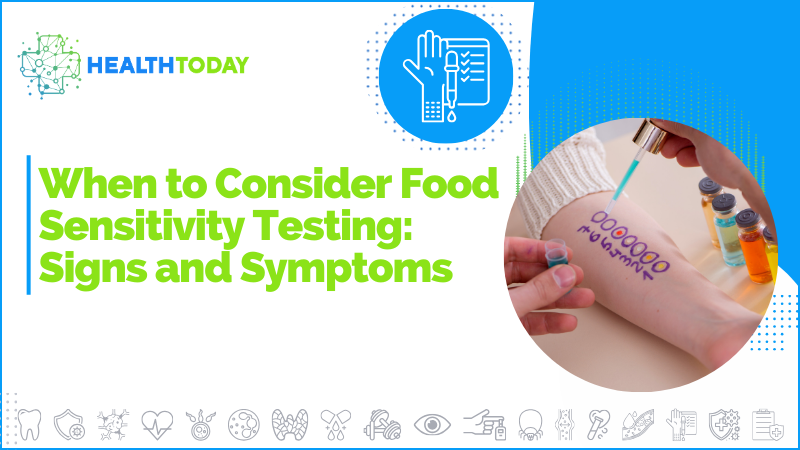
This guide emphasizes the importance of recognizing signs and symptoms linked to food sensitivities. It explains that these sensitivities are different from allergies and can lead to issues like digestion problems, skin troubles, headaches, tiredness, and mood swings. Undiagnosed food sensitivities may cause ongoing inflammation and a lack of essential nutrients. The article highlights how food sensitivity testing can help identify specific foods that trigger these reactions. By understanding these triggers, people can make informed choices about their diet, leading to better overall health and a life without the discomfort often caused by food sensitivities.
Food is not just sustenance; it's an integral part of our lives, connecting us with culture, memories, and comfort. However, for some, certain foods can bring discomfort and distress due to food sensitivities. These sensitivities can often go undiagnosed, leading to a myriad of health issues. In this article, we explore the importance of considering food sensitivity testing when you experience signs and symptoms that may be linked to dietary triggers. Our goal is to shed light on this often-overlooked aspect of health and well-being."Food Sensitivity Testing: Signs and Symptoms" is your informative guide to understanding when and why food sensitivity testing may be necessary. By recognizing the signs and symptoms associated with food sensitivities, we aim to empower individuals to take control of their health and make informed choices for a better quality of life.
Food sensitivities are distinct from allergies, often presenting with delayed reactions that can be challenging to pinpoint. Common symptoms include digestive issues like bloating, gas, diarrhea, or constipation, as well as skin problems like eczema or acne. Individuals may also experience headaches, fatigue, joint pain, or mood swings. Envision having a harmonious digestive system, vibrant skin, and consistent energy levels. Identifying these signs and symptoms is the initial stride towards uncovering the potential impact of food sensitivities on your overall well-being.
Ignoring or remaining unaware of food sensitivities can have a significant impact on your health. Over time, these sensitivities can lead to chronic inflammation, nutrient deficiencies, and the development of more severe conditions such as irritable bowel syndrome (IBS), autoimmune disorders, and even mental health issues like anxiety and depression. Imagine a future devoid of chronic inflammation, where your body receives the vital nutrients it requires, resulting in a significant enhancement of your overall well-being. Addressing food sensitivities plays a crucial role in the prevention or management of these conditions.
Food sensitivity testing is a valuable tool for identifying specific dietary triggers that may be causing your symptoms. It involves analyzing your blood for antibodies produced in response to particular foods. By pinpointing the culprits, you can make informed choices to modify your diet and alleviate your symptoms. Common food sensitivities often include dairy products, gluten-containing grains like wheat, certain nuts, eggs, and various additives or preservatives found in processed foods. Many individuals may also be sensitive to specific types of seafood, such as shellfish.Consider how valuable it would be to possess a clear understanding of which foods support your well-being and which ones may trigger discomfort. Food sensitivity testing can equip you with the insights required to customize your diet, promoting improved health and overall well-being.
It is important to be your own advocate and dig into the often overlooked world of food sensitivities, helping you recognize when you may need to consider testing. By understanding the signs and symptoms associated with food sensitivities, you take control of your health. Ignoring these sensitivities can lead to a host of health issues, making it crucial to address them proactively. Food sensitivity testing serves as a valuable tool for pinpointing dietary triggers, allowing you to make informed choices that can lead to a life free from the discomfort and distress of food-related symptoms. Picture yourself being able to savour the joys of food without worry, where your digestive system hums harmoniously, and where your energy and mood remain balanced. This is the promise of recognizing and addressing food sensitivities, a path to a healthier, happier, and more vibrant you.
Written on behalf of Health Today.
Food sensitivities are adverse reactions to certain foods that often involve delayed symptoms, while food allergies typically result in immediate and severe reactions. It is important to speak to your healthcare provider if you have concerns about your diet
Undiagnosed food sensitivities can lead to chronic inflammation, nutrient deficiencies, and more severe health conditions. Speak with your healthcare provider about how to manage your diet more effectively.
Food sensitivity testing involves a number of steps to determine most accurately your specific dietary needs. The process generally begins with consultation followed by testing, and/or sample collection. Results are given and interpreted with your healthcare provider. Following the results it is up to you to follow through and make the recommended dietary changes. Your healthcare provider will then monitor your progress. Food sensitivity testing helps pinpoint problematic foods, enabling you to make informed dietary changes for better health under professional guidance.